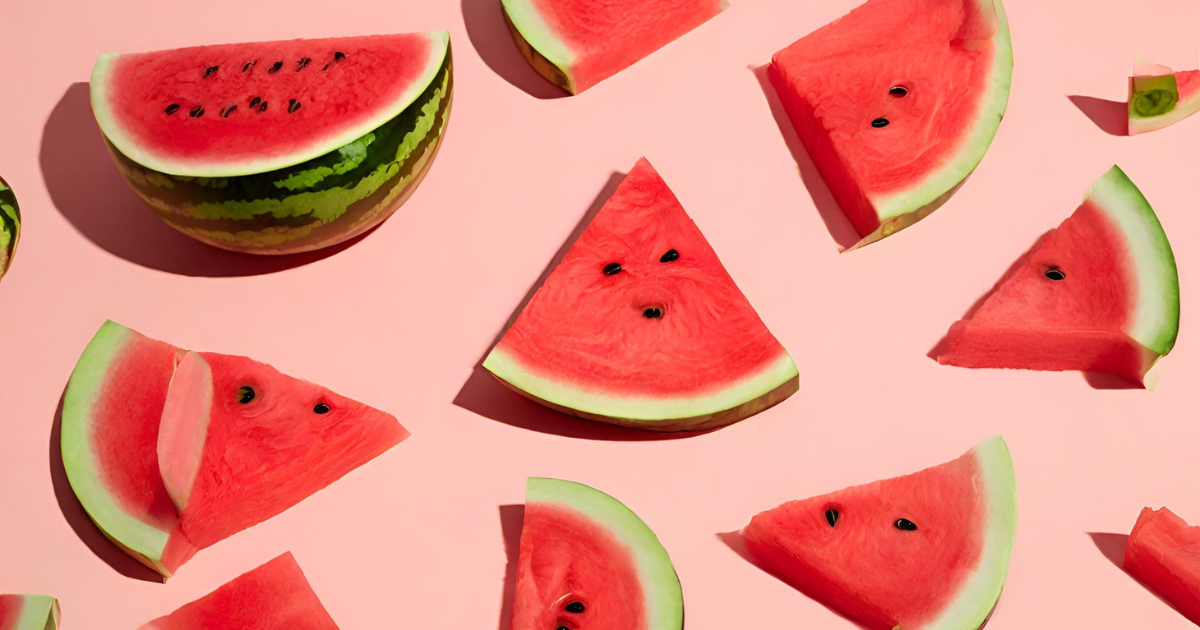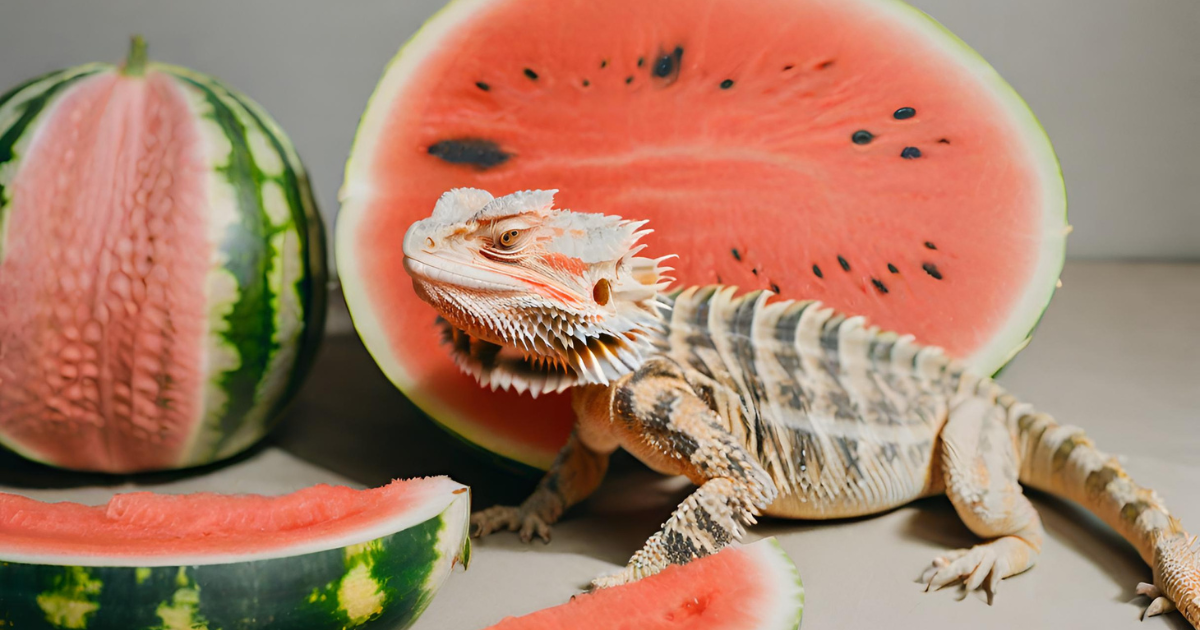Watermelon is a popular and delicious fruit enjoyed by humans during the warm summer months. But can bearded dragons eat watermelon? Many reptile owners wonder if watermelon is a safe food for their scaly friends.
The short answer is yes, bearded dragons can eat watermelon. Watermelon provides hydration and small amounts of beneficial nutrients like vitamins A and C. However, watermelon is high in sugar and water content. Feeding the fruits regularly to your beardies is a no-brainer.
This juicy summer fruit can be a safe way to add variety to the diet of these scaly reptiles. Follow my lead on how to incorporate the fruit into your bearded dragons.
Food Nutrition of Watermelon
Though not very rich in nutrition, watermelon has some food value. Check the below table:
| Nutrient | Amount per 100 g |
| Water | 91.4 g |
| Energy | 30 kcal |
| Protein | 0.61 g |
| Fiber | 0.4 g |
| Total Sugars | 6.2 g |
| Calcium | 7 mg |
Benefits of Eating Watermelon for Bearded Dragons
Bearded dragons can enjoy some benefits by eating watermelon. But it depends on proper serving. Here are some of the benefits they can enjoy from eating the fruit:

- Hydration: Watermelon is rich in water. In fact, the fruit is about 91% water. It keeps your pet hydrated during the hot season.
- Vitamins: The fruit is rich in vitamins A and C. These vitamins promote overall health and support the immune system.
- Electrolytes: Bearded dragons can get essential electrolytes from watermelon. These electrolytes maintain proper bodily function for them.
- Low in fat: Watermelon is a low-fat snack that contributes to a balanced diet for bearded dragons
- Antioxidants: The presence of antioxidants can assist in combating free radicals, supporting longevity.
- Palatability: Many bearded dragons find watermelons tasty. There can be some exceptions as well. My beardie, for example, does not like the fruit very much.
How to Serve Watermelon to Your Pet
I think I have already mentioned that serving the fruit in the right manner is crucial. Let me help you with the proper feeding method.
Step 1: Choose the Right Fruit
When selecting a watermelon to feed your pet, you’ll want to pick a ripe, healthy melon. Look for a watermelon that is heavy for its size with a smooth rind. Avoid melons with bruises, dents, or softened spots.
Ripe watermelon should have a creamy yellow spot. A ripe watermelon will also produce a hollow sound when thumped. Select a seedless variety when possible to reduce choking hazards. Personally, I like to pick small “personal” sized watermelons for my bearded dragon.
Step 2: Prepare the Fruits
First, wash the outside of the watermelon thoroughly under cool running water. This removes any dirt or bacteria that could make your pet sick. Once clean, cut the watermelon in half lengthwise.
Now, using a large spoon, scoop out and discard the seeds. Seeds can cause intestinal blockages if swallowed by pets. Next, peel away the outer green rind and discard it as well. The colorful red flesh is the only part your pet should eat. I make cubes for my lizard beardies.
Step 3: Serve the Fruit
When ready to serve, place the prepared watermelon pieces into your pet’s food dish. Provide fresh water as well to quench their thirst. Only introduce a few pieces at first to observe how your pet reacts. If they have loose stool later, discontinue feeding watermelon.
For bearded dragons, I put 4-5 small cubes in a bowl 2-3 times per month. Always monitor as they eat. Remove uneaten fruit within a few hours to avoid spoilage issues.
Step 4: Maintain A Diary
Keep a diary to record when and how much watermelon you fed your pet. Note any changes in stool, behavior, or appetite following consumption. This log can help you determine if watermelon agrees with your pet or not. Adjust frequency and quantities as needed.
Can Bearded Dragons Eat Watermelon Daily?
While watermelon can make a tasty treat for bearded dragons, it should not be part of their daily diet. Watermelon contains high amounts of natural sugar along with excess water. It causes digestive upset when fed regularly.
Bearded dragons have specific nutritional requirements. It includes appropriate levels of protein, vitamins, and minerals. Overindulging in sugary fruits consistently can also potentially cause obesity and related health issues.
In short, watermelon should only be offered occasionally, not daily. While small, infrequent portions are generally safe, watermelon does not provide balanced nutrition. Add other fruits like strawberries to their diet.
Side Effects of Watermelon for Bearded Dragons
Too much watermelon can lead to adverse health effects. Overindulging in this sugary fruit may result in the following side effects:
1. The Fruit Is High In Sugar
Watermelon contains more than 6% sugar. Bearded dragons do not require sugar in their body. Their digestive system is not suitable for dealing with sugar. This leads to obesity, liver disease, and even diabetes in reptiles.
2. Can Lead to Hypocalcemia
Watermelon is also very low in calcium. Bearded dragons need high levels of calcium for proper bone development and egg production. Too much watermelon without adequate calcium supplementation can lead to hypocalcemia or calcium deficiency. Give chicken eggs to them, as it is a good source of calcium for them.
3. Bearded Dragons May Suffer from Diarrhea
Diarrhea is a common side effect of high moisture and sugar content in watermelon. Loose, watery stool can lead to dehydration and nutrient loss if prolonged. Diarrhea may also indicate a digestive upset or imbalance. Discontinue watermelon at the first sign of diarrhea.
4. Chronic Protein Disease
Bearded dragons require adequate protein in their diet, about 30-50% of total calories. It is the building block of their cells. Watermelon is very low in protein. Feeding too much can lead to a chronic protein deficiency over time.
This causes muscle wasting, lethargy, poor growth and appetite. Maintain proper protein levels by offering a variety of greens, vegetables, and insects.
What Other Fruits Can Bearded Dragons Have?
Here are some other fruits that bearded dragons can have. Keep a variation so that they can enjoy their meal.
- Apples
- Bananas
- Berries (Strawberries, Blueberries, Raspberries)
- Papaya
- Mango
- Pears
- Pineapple
- Kiwi
- Melons (Cantaloupe, Honeydew)
- Oranges
- Peaches
- Plums
- Grapes
- Cherries
- Guava
FAQ
Let’s have a quick look at the following commonly asked questions. This will help you maintain a good diet for them.
How Often Can Bearded Dragons Eat Watermelon?
Feed bearded dragons watermelon as an occasional treat, not a regular part of their diet. Introduce it once or twice a week in small, bite-sized pieces. Moderation ensures they enjoy the tasty snack without disrupting their balanced nutrition.
Can Bearded Dragons Eat Watermelon Rind?
No, bearded dragons should not eat the rind of a watermelon. The tough outer skin is difficult to digest and may cause gastrointestinal blockages. Always peel off the green rind before feeding the red watermelon flesh to your bearded dragon.
How Many Watermelons Can A Bearded Dragon Have?
Bearded dragons should only eat small amounts of watermelon as an occasional treat. A good rule of thumb is to feed no more than 2-3 cubed inches of watermelon flesh 2-3 times per month. Overfeeding watermelon can lead to digestive issues and nutritional imbalances.
Can Bearded Dragons Eat Watermelon Seeds?
No, bearded dragons should not eat watermelon seeds. The seeds pose a choking hazard and can cause intestinal impaction or blockage if swallowed. It’s important to scoop out and remove all seeds from watermelon first.
Can Bearded Dragons Eat the White Part Of Watermelon?
Yes, bearded dragons can eat the white part of watermelon along with the red flesh. The white rind next to the red is edible and contains nutrients. Just be sure to peel off the tough outer green skin first. All the colorful internal watermelons are safe for dragons to eat in small amounts.
Can Bearded Dragons Eat Watermelon Juice?
No, bearded dragons should not drink or eat watermelon juice. The high sugar and water content of the juice can cause digestive problems like diarrhea. It’s best to remove excess liquid and just feed the dragon the solid watermelon flesh.
Can Baby Bearded Dragons Eat Watermelon?
Baby bearded dragons can eat small amounts of watermelon on occasion. Wait till they are a few months old. However, it should make up a very small part of their diet. Focus on feeder insects, veggies, and fruits higher in calcium for growing babies.
Conclusion
Watermelon can be a safe and healthy treat for bearded dragons when fed properly. Offer just a few small cubes occasionally, monitor the reaction, and pair them with nutritious staple foods. Always exercise caution and moderation. Follow these tips, and both you and your bearded dragon can have fun with watermelon without complications!
